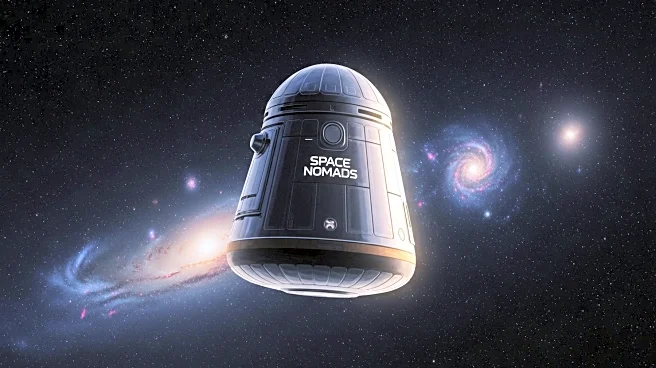What is the story about?
What's Happening?
Blue Origin successfully launched its 15th space tourism flight on October 8, 2025, from its West Texas site. The mission, known as NS-36, carried six passengers, including a mystery passenger who revealed his identity post-flight. The New Shepard vehicle, used for the mission, achieved a suborbital flight, reaching over 62 miles above Earth, surpassing the Kármán line, the recognized boundary of outer space. The passengers experienced a few minutes of weightlessness and viewed Earth from space. The crew, self-dubbed the 'Space Nomads,' included Jeff Elgin, Danna Karagussova, Clint Kelly III, Aaron Newman, and Vitalii Ostrovsky. The mystery passenger was later identified as Will Lewis, CEO of Insmed. The mission lasted 10 minutes and 21 seconds, with the New Shepard's first stage and capsule successfully returning to Earth.
Why It's Important?
This launch marks a significant milestone in the commercial space tourism industry, showcasing Blue Origin's continued commitment to making space travel accessible to private individuals. The successful mission highlights the growing interest and investment in space tourism, potentially paving the way for more frequent and affordable space travel experiences. The involvement of high-profile individuals and entrepreneurs underscores the appeal and potential market for space tourism. This development could stimulate economic growth in the aerospace sector and inspire technological advancements, as companies strive to improve safety, efficiency, and the overall experience of space travel.
What's Next?
Blue Origin is likely to continue its space tourism missions, with future flights potentially increasing in frequency as demand grows. The company may also explore expanding its offerings, possibly including longer flights or additional experiences for passengers. The success of these missions could encourage other companies to enter the space tourism market, increasing competition and innovation. Regulatory bodies may also need to adapt to the evolving landscape of commercial space travel, ensuring safety and sustainability as the industry expands.
Beyond the Headlines
The ethical implications of space tourism, such as environmental impact and accessibility, may become more prominent as the industry grows. The carbon footprint of frequent launches and the exclusivity of space travel, primarily accessible to wealthy individuals, could spark debates about the responsible development of this sector. Additionally, the cultural impact of making space travel a reality for civilians could inspire a new generation of scientists and engineers, fostering a renewed interest in space exploration and STEM fields.
















